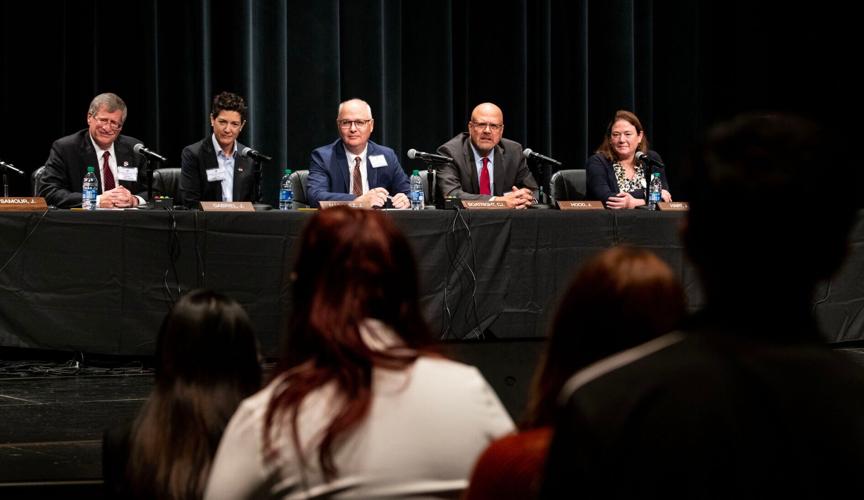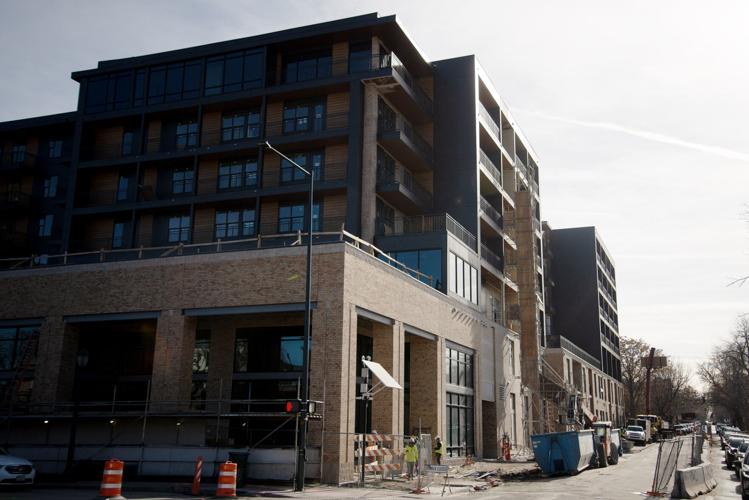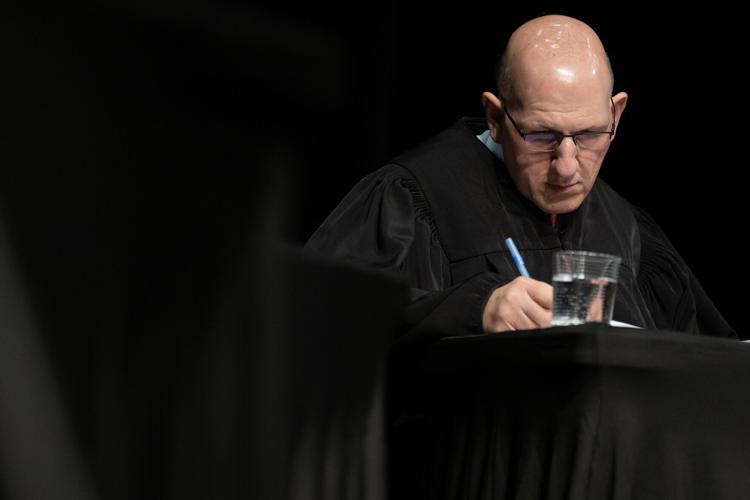Colorado Supreme Court retracts decision recognizing right to jury trial in eviction cases

FILE PHOTO: Students from Pine Creek High School ask the justices of the Colorado Supreme Court questions after watching them hear arguments from two cases in the high school auditorium on Nov, 17, 2022. Pictured from left to right are Justice Richard L. Gabriel, Justice Monica M. Márquez, Chief Justice Brian D. Boatright, Justice William W. Hood III and Justice Melissa Hart.
Parker Seibold/The Gazette
The Colorado Supreme Court took the extraordinary step on Monday of retracting its two-month-old decision recognizing tenants have the right to a jury trial in certain eviction disputes.
In a three-page, unsigned order, the Supreme Court explained its prior opinion “rested on a factual premise that the Court has now been advised was inaccurate.” Rather than reassess its reasoning, the justices opted to abandon the issue outright.
It is “up to the legislature to clarify its intent,” the court wrote.
“It’s surprising to see the Colorado Supreme Court dramatically and unexpectedly reverse itself just two months after its landmark decision,” said Spencer Bailey, who represented tenant Naomi Bermudez in her eviction appeal before the court. “By rolling back critical rights that were recognized just two months ago, the court has created more confusion for landlords, tenants, and trial courts.”
Originally, the court was presented with the question of whether tenants challenging their evictions are entitled to have a jury decide any disputed factual issues. By a 4-2 decision in October, the justices answered “yes.”
Although she received a favorable decision in her case, Bermudez quickly filed a petition asking the court to reconsider.
The decision had touched on two sections of Colorado’s eviction law: one applying to tenants who are personally served with a notice of eviction and one applying to tenants who are served otherwise — such as a posted notice on their door. Crucially, only the section for personal service mentions a jury.
The Supreme Court proceeded on the understanding that Bermudez was personally served with her notice of eviction.
“This language contemplates that a jury (not just a court) may try” the issue, wrote Justice Carlos A. Samour Jr.
However, Bermudez’s petition alerted the court that she was not, in fact, personally served. Instead, she only received notice through a posting on her door and in the mail. The court’s analysis, therefore, did not actually apply to her.
Nevertheless, her attorney argued the Supreme Court should read both sections together, such that the right to a jury trial applied no matter the circumstances in which a tenant is informed of their eviction.
Bermudez’s landlord, Mercy Housing Management Group Inc., agreed the court made a mistake, but disagreed that the outcome should remain the same.
The opinion is “crystal clear that tenants are only entitled to a jury trial when personally served,” wrote attorney Chrisopher R. Cunningham.
Instead of engaging in a new analysis, the Supreme Court chose to ditch the question entirely, believing the law “does not make clear” whether a person in Bermudez’s circumstances has the right to a jury trial.
“The Court is unwilling to proceed by judicial fiat,” the justices wrote in the Dec. 16 order, punting to the legislature to decide whether and when the right to a jury trial applies.
The withdrawn opinion means county courts will likely resume the practice of trying eviction cases to a judge, not a jury.
“Colorado Poverty Law Project is disheartened and disappointed by the Colorado Supreme Court’s ruling that retracted their prior decision recognizing the right to a jury trial in evictions,” said Jack Regenbogen, deputy executive director of the legal aid organization. “This decision undermines due process for Coloradans at risk of losing housing, and moreover, it creates judicial confusion based on an arbitrary and meaningless distinction — whether the tenant received notice by a person or by posting on their door.”
He added that he hopes the General Assembly will address “this miscarriage of justice.”
“I plan on reviewing the order with my colleagues and charting an appropriate course,” said Rep. Steven Woodrow, D-Denver, an attorney who litigates on behalf of tenants.
Justice Brian D. Boatright did not participate in the case. As is the Supreme Court’s practice, he did not disclose the reason for his recusal.
The case is Mercy Housing Management Group Inc. v. Bermudez.
Editor’s note: This story has been updated with additional comments.






